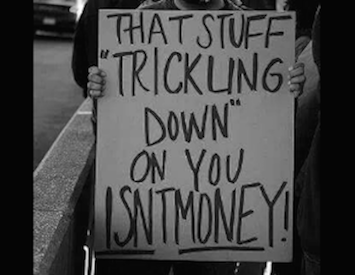2016 may go down as the year of bad news but Mike Dowson lightens the new year mood with a good neoliberal bedtime story.
SETTLE DOWN now kids. We’ve all had a lovely holiday but all good things must come to an end. So, hop under the covers and Uncle Mike will read you a nice bedtime story.
This is a story about Malcolm’s Farm. It’s a very big farm and it grows lettuce. Malcolm’s Farm used to be a very happy place. It grew so much lettuce that people had lots of time to do other things.
When he wasn’t growing lettuce, Ned liked to play the bagpipes. Nobody else liked it much. “Bloody nonsense,” said Mrs Moody.
Matilda looked after sick people. Together, she and Ned earned enough to live comfortably and raise their children, Max and Hermione.
For years, the farm flourished. But as technology improved, the farm could produce more lettuce with fewer workers. When Ned lost his job, he found a new one cleaning out the rabbit hutch and life went on. “We’ll be alright,” he told Matilda.
You might want to read this @ScottWalker @govsambrownback :https://t.co/nPHMvYbeST
— this is not normal. (@sooatwoo) January 6, 2017
One day, the farm managers had an idea. It was an idea they got from business school. Business school is where you learn about a place called "the market", as an alternative to doing something useful. The farm managers were proud of their idea, which they announced over the PA system. They decided to put the rabbit in charge of the lettuce.
It seemed like a good idea at the time, because the rabbit is a fine, upstanding member of the farm community and, well, the farm managers frankly didn’t know much about farming. They believed in something called the "trickle-down theory". Nobody knew where it came from but it sounded very professional, which is what you need these days. But soon they started hearing stories from the other farms.
The other farms had discovered that you tend to end up with not much lettuce and a lot more rabbit. On some farms, the rabbit grew so much that he bore more than a passing resemblance to Jabba the Hutt. Meanwhile, millions were going without lettuce. The "trickle-down theory" had lost credibility. Nobody much liked the idea of anything trickling down from Jabba the Hutt. “Bloody nonsense,” said Mrs Moody.
The farm managers weren’t worried at all. Luckily for them, there was a huge demand from the other farms for gremlins. The gremlins lived in a vast network of caves under the farm. The farm managers realised they could dig up the gremlins and sell them. To do this, they needed a lot of big, expensive things called "infrastructure" because gremlins are difficult to handle. That meant jobs. So, Ned got a new job building infrastructure. “I told you we’d be alright,” he told Matilda.
#Turnbull government eyes $1 billion Adani loan https://t.co/53TLznsOQ0
— Bob (@bedwards883) December 5, 2016
Now the workers could concentrate on what really mattered to them, which was real estate. To help workers feel better about the expanding rabbit, the farm managers allowed them to claim back some of the cost of real estate. This caused a big increase in real estate prices. Buyers had to borrow more to pay for the real estate. To do this they went to the rabbit, who in turn borrowed it from the other farms.
The farm managers thought they had the perfect system. The other farms wanted gremlins. So they paid a modest fee to dig up the farm. The workers wanted real estate. So they borrowed from the rabbit and the other farms to buy it from each other.
Everyone was happy. Or at least, everyone that mattered. The people from the other farms got the gremlins and a big share of future lettuce production. Rising real estate prices made owners feel like they were getting rich. The rabbit got most of the lettuce and the rabbit hutch was very clean, because there were more and more displaced workers to clean it.
Of course, this wouldn’t be a proper story unless it had some villains in it. Remember those workers who weren’t needed anymore?
Now the infrastructure was all built, the other farms could get their gremlins without local workers. There were fewer jobs, and the workers had more debt and less to buy lettuce. Demand for lettuce fell. And in any case, farming wasn’t as popular as real estate, so there wasn’t as much lettuce anyway. It turned out the rabbit preferred truffles, which he got from the other farms.
Mining industry to lose 50,000 more jobs as boom comes to an end: NAB (Communities let down badly by mining #Auspol) https://t.co/VjL2JNCKCo
— Anglesea After Coal (@AngleseaAC) June 10, 2016
People like Ned and Matilda had frittered their lives away on productivity. Where were the private school connections they should have had? Where were the tax shelters? Now they couldn’t afford lettuce or real estate. They couldn’t even get a job cleaning the rabbit hutch. Instead of regretting their foolish choices, they became resentful and started making trouble.
Max and Hermione now had degrees in neuroscience and soil chemistry — things that just aren’t needed for digging up gremlins or cleaning the rabbit hutch. They were so molly-coddled they thought they deserved a chance in life. “They’ll be alright,” Ned told Matilda. But no one was very happy about it.
Seeing that something had to be done, the farm managers concocted a new plan. They decided that workers should accept lower wages, hand over more of the farm to the rabbit, and direct their anger and resentment to people who look different and wear unfamiliar clothes. To help sweeten the programme, they thought of a word that sounded vaguely optimistic. The word was "innovation". It meant they hoped the rabbit would think of something.
The farm managers realised that people would only suffer obediently if they thought the rabbit was "one of us". So the rabbit put on moleskins, boots and a wide-brimmed hat. He spoke to them about innovation and the market, which sounded professional. He recalled a glorious past and the values that had made the farm great — such as outdoing your neighbour and bullying the less fortunate. Unlike real estate, few people knew much about farming anymore, so it sounded plausible. “He’s alright, that rabbit,” said Ned.
Not everyone was convinced. “Bloody nonsense,” said Mrs Moody.
2016 Climate Trends Continue to Break Recordshttps://t.co/7p87STLdqY https://t.co/RiB7GNynjK
— The Rejected (@TRej2011) December 14, 2016
Before long, there was more bad news from the other farms. The gremlins had escaped and were causing trouble. People called "scientists" issued dire warnings about what might happen. Many others didn’t listen. The scientists weren’t "one of us". The scientists didn’t wear boots or moleskins and they used funny words. Anyway, the farm managers had been to business school.
Then, one day, something terrible and unexpected happened. The rabbit got very sick. The doctor said it was an overdose of truffles. Everyone was very worried. The rabbit had been sick before but each time people had pitched in and gone without things, like schoolbooks and medicine, to help him get better. The rabbit was very important because, well, he had all the lettuce.
One of the workers made a frightening discovery. There wasn’t as much lettuce in the storeroom as people thought. And much of it had rotted. The farm was all dug up. Not enough people knew how to farm anymore. Many good farmers had gone to work on the other farms.
The value of real estate began to fall. It turned out that producing things that people need is more important than trading in real estate. Some people lost their jobs and homes. But they still owed the rabbit and the other farms. “I thought we’d be alright,” said Ned, crying into his hands.
People became very upset. They looked for someone to blame. The farm managers decided to crack down on poor people. They thought this made them look serious and important.
“Bloody nonsense,” said Mrs Moody. “That useless rabbit caused this. And those farm managers who wouldn’t know their backsides from a gremlin hole!”
Aren’t we lucky we don’t live in a place like Malcolm’s Farm? What do you think happened next? I can see your eyelids getting heavy, so snuggle up and in a few more sleeps we’ll find out how the story ends.

This work is licensed under a Creative Commons Attribution-NonCommercial-NoDerivs 3.0 Australia License
Monthly Donation
Single Donation
It's progressive. Subscribe to IA for just $5.











